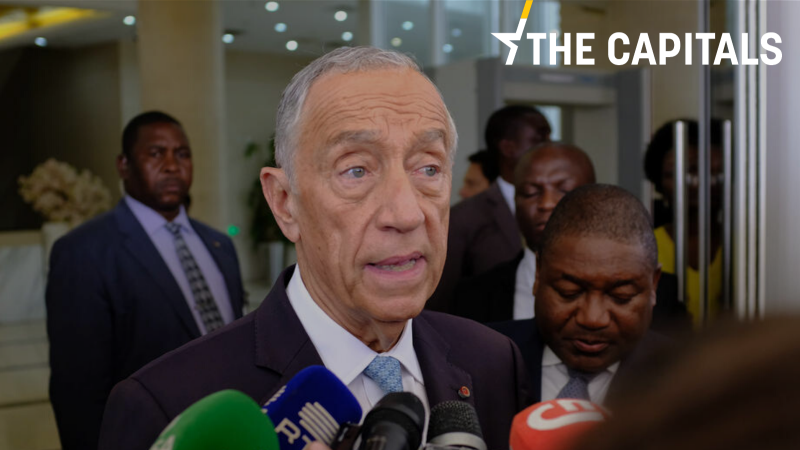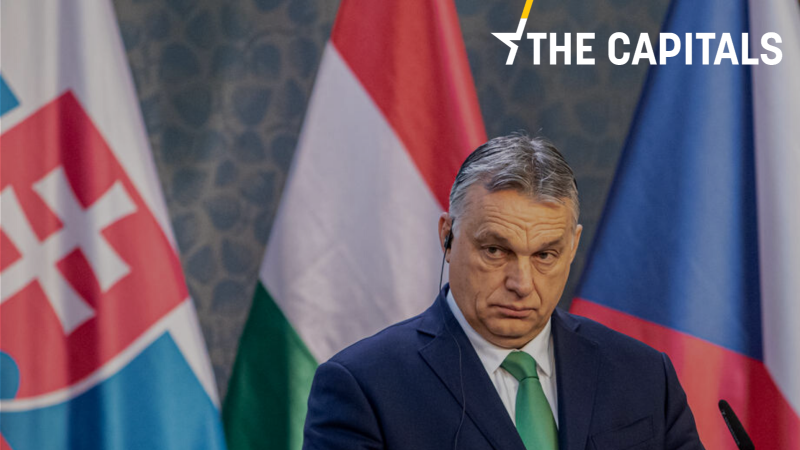
BUDAPEST. Hungary’s stance against illegal migration has become the generally accepted approach in Europe, Prime Minister Viktor Orbán told the Visegrad Group summit in Prague. “It was us who announced a policy against Muslim migration” the PM added, referring to the border fence Hungary set up in 2015. EURACTIV Croatia’s Željko Trkanjec has more.
Meanwhile, two Iranian students in Hungary tested positive for the coronavirus, Orbán posted on his Facebook page. Vlagyiszlav Makszimov has the detail.
BERLIN
Ramelow wins in Thuringia. Left-wing politician and former Minister-President of Thuringia, leftist Bodo Ramelow (Die Linke), was elected to lead the former east German state of Thuringia in the third round of voting yesterday (4 March). His election brings an end to the state’s month-long governing crisis that began when Thomas Kemmerich (FDP) surprisingly won a majority with votes from the CDU and far-right Alternative for Germany (AfD), which sparked nationwide protests. EURACTIV Germany’s Sarah Lawton looks at how the voting unfolded.
BRUSSELS
Citizen power. 5,000 Brussels citizens have used their right to petition to be heard in front of the regional parliament to demand that Brussels should be declared a “region outside CETA” and that a popular consultation be organised on the subject. Alexandra Brzozowski has more on the matter.
VIENNA
Highest court nullifies government attempt to curb parliamentary inquiry. While the governing coalition of the conservative ÖVP and the Greens attempted to block a parliamentary inquiry on Austria’s latest corruption scandals, including the so-called ‘Ibiza affair‘, and the reform of the financial monitoring agency as proposed by the opposition so as to include one specific case of nepotism, the country’s Constitutional Court found the step illegal and nullified it. This means that the parliamentary inquiry will start in full force, much to the joy of the opposition. (Philipp Grüll | EURACTIV.de)
HELSINKI
Moscow hits at Turkey. Russia has absolutely no intention to stop its military operation in Syria until the “adversary” is defeated, stated Russia’s Foreign Minister Sergei Lavrov on Tuesday (3 March). While he added that he understood the difficulties of the refugee situation in the EU, he said Russia “can’t give up the fight against terrorism to solve that issue, even if we are repeatedly asked to do so”. Pekka Vänttinen reports from Helsinki.
DUBLIN
Irish EU contributions ‘really cheap‘. Taoiseach Leo Varadkar has highlighted how he believes his country’s contributions to the EU are comparatively low, calling them ‘really cheap’. In 2018, the country contributed €315 million net.
Speaking to guests at a Trinity College Dublin gathering, Varadkar said that Ireland, despite being a net contributor to the EU budget, only pays a ‘small price’ for the ‘enormous intangible benefits’ the country receives in return. “It is a steal, it is really cheap if you think about what we get back from the European Union for the amount that we contribute,” he said. (Samuel Stolton | EURACTIV.com)
EUROPE’S SOUTH
ROME
Transparent meetings in the EU. Diplomats in the Italian Permanent Representation to the EU will meet lobbyists only if they’re enrolled in the EU’s transparency register. Italy’s PermRep will also publish the agenda of the meetings with the stakeholders on its website, as part of the new transparency plan adopted on a voluntary basis. EURACTIV’s Gerardo Fortuna takes a closer look.
MADRID
Spain expects ‘little’ impact of coronavirus on the economy. While Spain has reported over 150 confirmed COVID-19 cases, according to figures from Spain’s health ministry, Economy Minister Nadia Calviño said on Wednesday (4 March) she did not expect the coronavirus outbreak to have a big impact on the local economy, EURACTIV’s partner EFE reported. However, Calviño also stressed that it is “difficult to anticipate and estimate the exact impact” the COVID-19 crisis would have on the Spanish economy and urged people to be cautious and follow the established health protocols.
On Tuesday (March, 3), Health Minister Salvador Illa recommended that all sports events (mainly football matches) be held indoors, to prevent new contagions. (EuroEFE.EURACTIV.es)
VISEGRAD
WARSAW
First coronavirus case reported. Poland’s first person with the COVID-19 virus is a man who came back from Germany to the city of Zielona Góra in western Poland. While he is now in good condition, a dozen people in the country are currently being monitored for a possible infection. (Łukasz Gadzała | EURACTIV.pl)
PRAGUE
V4 shares position on coronavirus, migrants and budget. Prime ministers of the four Visegrad countries met yesterday in Prague and agreed on closer cooperation with regards to preventing the spreading of the COVID-19 virus (five cases in Czechia, one in Poland, none in Hungary and Slovakia) and agreed to help Greece and other Balkan states with the current migrant pressure. The group also agreed that the future EU budget should be “more ambitious”.
In other news, the European People’s Party cancelled the meeting of its EU Parliament group, planned to be held in Prague on Thursday and Friday, as a precautionary measure against the spread of the novel coronavirus, the EPP told the Czech News Agency. Other public events in the Czech Republic are also being cancelled. (Ondřej Plevák | EURACTIV.cz)
BRATISLAVA
Government negotiations have officially started. Igor Matovič (Ordinary People) was officially assigned by President Zuzana Čaputová with the task of forming a new government coalition. After another day of negotiations, it appears increasingly likely that Boris Kollár’s We Are Family will be part of the new government. The participation of Andrej Kiska’s For the People party now remains ‘an open question’. (Zuzana Gabrižová | EURACTIV.sk)
NEWS FROM THE BALKANS
SOFIA
Attitudes towards recycling and climate change. Only 23% of Bulgarians (the lowest share in the EU) have separated most of their waste for recycling in the past six months, a Eurobarometer survey showed. In Bulgaria, 82% of people agree that clothes should be available at the lowest possible price, regardless of the environment or the working conditions in which they were made. At the same time, Bulgaria is one of the six EU countries where more than eight in ten respondents think that climate change is a very serious problem in their country. (dnevnik.bg)
ZAGREB
Military budget too low. Investing in the European defence industry is an investment in citizens’ security, and appropriate funding is needed for this, Deputy PM and Defence Minister Damir Krsticevic said on Wednesday (3 March) at an Inter-Parliamentary Conference in Zagreb attended by EU defence officials. EURACTIV Croatia’s Karla Junicic digs deeper.
LJUBLJANA
30 migrants found hiding in clay. While controlling a composition of 20 closed wagons transporting clay from Serbia, Slovenian border police discovered 30 migrants from Iraq, Syria, Iran and Afghanistan who had been hiding inside. The police found 12 children aged between five and 14, a woman close to giving birth, as well as three in need of medical attention. Because the clay on the surface had started to harden, the influx of oxygen was already slowing down, meaning the migrants had only narrowly escaped death.
Besides, Slovenian organisers have cancelled the International Boat Show Internautica 2020, which was supposed to be held in Trieste this year instead of on the Slovenian coast.(Željko Trkanjec | EURACTIV.hr)
BELGRADE
Serbian President calls general elections for 26 April. Serbian President Aleksandar Vucic called on Wednesday (4 March) for the regular parliamentary elections to be held on 26 April. Earlier, Parliament Speaker Maja Gojkovic also called the local vote for the same day. EURACTIV Serbia and betabriefing look into what the elections have in store.
In other news, Serbia remains in the group of “partly free” states as it slips to the 67th spot. This means it has joined a group of around 30 countries with the largest drop in freedoms over the past ten years, according to Freedom House’s latest annual report. Read more.
Rivlin thanks Vucic for announcing the opening of Serbia’s Diplomatic Mission in Jerusalem. Israeli President Reuven Rivlin has thanked Serbian President Vucic for Serbia’s intention to open a diplomatic mission in Jerusalem, underlining that it is yet another sign of the deep relations existing between the two countries, the Times of Israel newspaper reported on Wednesday (4 March). EURACTIV Serbia and betabriefing have more.
SARAJEVO
Russia: build bridges between Bosnian parties. “We consistently advocate the promotion of intra-Bosnia dialogue based on equality, mutual respect and a future-oriented approach. We hope all foreign partners interested in sustainable stabilisation in BiH will contribute to building bridges between the Bosnian parties and expanding the constructive agenda, and refrain from unbalanced assessments that could further complicate the situation,” the Russian Ministry of Foreign Affairs said in a statement.
EURACTIV Croatia’s Željko Trkanjec has more.
In other news, Bosnia’s security minister said he favours army deployment on the border. “We have a legitimate right to defend our sovereignty, our way of life and our citizens and to use all our potential. If other countries deploy their armies on their borders, I do not see any valid reason why BiH should not do so too,” Minister Fahrudin Radončić said. (Željko Trkanjec | EURACTIV.hr)
PODGORICA
EU Commission sees enlargement as a political process, says foreign minister. The European Commission takes into account the competitiveness of other powers in the region and sees the enlargement policy not only as a technical process but also as a political process, and this year could represent a new momentum in enlargement, according to Foreign Minister Srdjan Darmanović. In an interview with MINA, Darmanović said this was, to a certain extent, the intention behind the new methodology in negotiations with the EU. (Željko Trkanjec | EURACTIV.hr)
PRIŠTINA
‘We cannot rely on the EU,’ president says. Kosovo should seize the opportunity now the US has increased its interest in reaching a final deal with Serbia, said President Hashim Thaci. Talking about the EU’s role in the dialogue, the president added that the EU could not help convince Serbia to recognise Kosovo, reminding that the EU had failed to convince five of its members to recognise Kosovo’s independence. EURACTIV Croatia’s Željko Trkanjec looks into it.
TIRANA
Kuwaiti fund lending $22 million to finance road project in Albania. An agreement with the Kuwait Fund for Arab Economic Development for an additional loan of $22 million (€19.8 million) to be used to finance the construction of a road section along the Vlora river has been signed by Albania’s finance ministry, the ministry said. The 23.7-km section Ura e Laskos – Qeparo is part of the 94 km road linking the city of Vlora and Tepelena village with the coastal area, the ministry said in a press release.
EURACTIV’s Željko Trkanjec has the details.
***
[Edited by Sarantis Michalopoulos, Daniel Eck, Zoran Radosavljevic]






Komentari
0